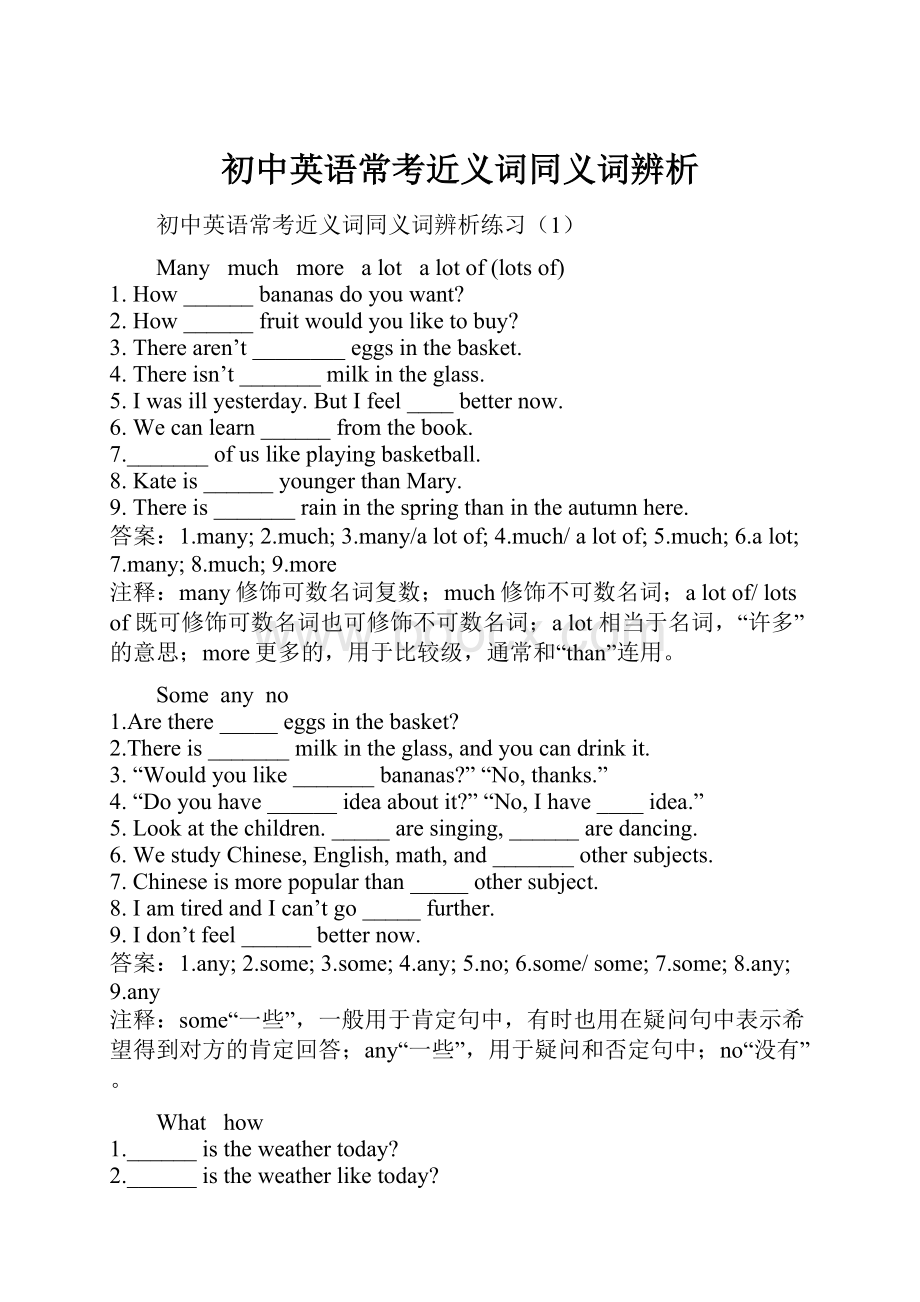初中英语常考近义词同义词辨析.docx
《初中英语常考近义词同义词辨析.docx》由会员分享,可在线阅读,更多相关《初中英语常考近义词同义词辨析.docx(36页珍藏版)》请在冰豆网上搜索。

初中英语常考近义词同义词辨析
初中英语常考近义词同义词辨析练习
(1)
Many much more alot alotof(lotsof)
1.How______bananasdoyouwant?
2.How______fruitwouldyouliketobuy?
3.Therearen’t________eggsinthebasket.
4.Thereisn’t_______milkintheglass.
5.Iwasillyesterday.ButIfeel____betternow.
6.Wecanlearn______fromthebook.
7._______ofuslikeplayingbasketball.
8.Kateis______youngerthanMary.
9.Thereis_______raininthespringthanintheautumnhere.
答案:
1.many;2.much;3.many/alotof;4.much/alotof;5.much;6.alot;7.many;8.much;9.more
注释:
many修饰可数名词复数;much修饰不可数名词;alotof/lotsof既可修饰可数名词也可修饰不可数名词;alot相当于名词,“许多”的意思;more更多的,用于比较级,通常和“than”连用。
Some any no
1.Arethere_____eggsinthebasket?
2.Thereis_______milkintheglass,andyoucandrinkit.
3.“Wouldyoulike_______bananas?
”“No,thanks.”
4.“Doyouhave______ideaaboutit?
”“No,Ihave____idea.”
5.Lookatthechildren._____aresinging,______aredancing.
6.WestudyChinese,English,math,and_______othersubjects.
7.Chineseismorepopularthan_____othersubject.
8.IamtiredandIcan’tgo_____further.
9.Idon’tfeel______betternow.
答案:
1.any;2.some;3.some;4.any;5.no;6.some/some;7.some;8.any;9.any
注释:
some“一些”,一般用于肯定句中,有时也用在疑问句中表示希望得到对方的肯定回答;any“一些”,用于疑问和否定句中;no“没有”。
What how
1.______istheweathertoday?
2.______istheweatherliketoday?
3.Idon’tknow_______todo.
4.Idon’tknow______todoit.
5.“______doyoulikethefood?
”- “Verymuch.”
6._____doyouthinkofthismovie?
7._______doyoulikeaboutchina?
Thepeopleandthefood.
8.Hedoesn’tknow_____todowiththisbrokenbike.
9.Canyoutellme_____todealwiththisproblem?
10.“_____ishelike?
”“Heisseriousandkind.”
11.“_______doeshelooklike?
”“Heistallandhascurlyhair.”
答案:
1.how;2.what;3.what;4.how;5.how;6.what;7.what;8.what;9.how;10.what;11.what
注释:
询问天气有两个句型:
howistheweather?
/Whatistheweatherlike?
;3,4两个句子中从句部分,如果不定式”todo”后面不接任何名词或代词,从句引导词用”how”,反之,则用”what”;5句,询问程度用”how”;6句,whatdoyouthinkof+某人/某事物——你觉得-----怎么样?
;8,9句与3,4句做法相同;10,11句,固定句型:
whatishelike?
他性格怎么样?
/whatdoeshelooklike?
他长什么样?
Have has thereis thereare isthere arethere
1.Howmanyminutes_____________inanhour?
2.We________manyflowersinourgarden.
3._______youaniphone5?
=doyou______aniphone5?
4._____________ablackboardandalotofdesksintheclassroom.
5._____________fourseasonsinayear.
6.Oneofmyfriends______aplane.
7.__________alotofmilkinthebottle.
8.______________threebottlesofmilkinthefridge.
9.He_____apeninhishand.
10.___________anycheeseontheplate?
11.______________anypeopleintheclassroom?
12.There____________afootballmatchtomorrow.
13.There__________________achurchhere.(过去有).
14.There____________somebodyintheoffice.(一定有)
答案:
1.arethere;2.have;3.have/have;4.thereis;5.thereare;6.has;7.thereis;8.thereare;9.has;10.isthere;11.arethere;12.willbe;13.usedtobe;14.mustbe
注释:
have,has“有”,主语只能是人,第一二人称及第三人称复数用have,第三人称单数用has;therebe句型也表示“有”的意思,4,5句要注意therebe句型的“就近原则”,即:
be动词用单数还是复数要看其后的名词或代词是单数还是复数,如果是单数be动词就用单数,反之用复数;7句,milk是不可数名词,be动词用单数;8句,虽然milk不可数,但紧跟therebe句型后的名词是bottles(复数),所以按就近原则,应该用”thereare”;10句,cheese不可数,所以be动词用单数,11句中,people是可数名词复数(people单复数同形),所以be动词用复数;12句,tomorrow暗示事情应该发生在将来,所以用therewillbe(将来会有-----);13句,thereusedtobe过去有------;14句,theremustbe一定有------
Good well fine nice
1.Tomisa______boy.Heplaysfootballvery_____
2.Heis______atmathandshedoes_____inEnglish
3.It’sa______day.Let’sgoforawalk
4.Thiskindoffoodis_____toeat
5.Doyouknowtom?
Yes,Iknowhimvery______
6.Shesings_____anddances______
7.Howareyou?
________________thankyou,andyou?
8.Hefeels_______enoughtogotoschoolnow.
9.Sportsare______forourhealth
10.The_______teacherisalways________toherstudents
答案:
1.good/well;2.good/well;3.fine;4.good;5.well;6.well/well;7.fine;8.well;9.good;10.nice/good
注释:
四个词都有“好“的意思,good常用在名词前做定语,或用在”be”动词后面做表语,不能用在动词后修饰该动词;well可用在动词后修饰该动词,也可表示状态好,身体好;fine可形容天气好(晴朗),还可用来回答“howareyou?
你好吗?
”表示自己很好;nice有“漂亮”的意思,常指外形(貌)好。
注意几个固定搭配——begoodat=dowellin擅长做某事;begoodfor对-----有好处;begoodtosb.对某人好;begoodtodosth.做某事是有好处的
In on at
1.___theeveningofOctober5th,Isawacarrunintotheriver
2.___asummereveningwhenhewasonhiswayhome,abigdogwasfollowinghim
3.Thisstoryhappened_____acoldeveningofJanuary1999
4.Weusuallydoourhomework___theevening
5.shelikestogooutforawalk_____night
6.______arainynight,Ilostmywayinawoods.
答案:
1.on;2.on;3.on;4.in;5.at;6.on
注释:
在具体某天的上下午,晚上用”on”;当”morning,afternoon,evening,night”前有词语修饰时,也用”on”;intheevening(morning/afternoon)是固定短语,此外注意”atnight=inthenight在晚上;onthecoldnight”(当night前有词语修饰时也用“on”)
Find findout lookfor
1.That’smyMP5.Ilostitamomentago.Who_____it?
2.I___itjustnow,butIcouldn’t____it.
3.I‘dliketomakeatriptoThailand.Willyou____whatwecandothere?
4.Wemust_____whobroketheglassofthewindow
5.Whatareyoudoing?
I’m_____myglasses
6.Thinkhard,andyouwill____theanswertotheproblem
答案:
1.found;2.lookedfor/find;3.findout;4.findout;5.lookingfor;6.find
注释:
find(过去式found)“找到”,强调结果;lookfor“寻找”,强调过程;findout“弄清楚,查明”。
See look lookat watch visit read
1._____outofthewindow,andyouwill____whatyouwant
2.Idon’twanttogosofarto_____afilmonthecoldnight
3.Didyou_____yesterday’sfootballmatch?
Itwasveryexciting
4.She_____aroundherand______nothingunusualintheroom.
5.You___illandyoumustgoto______adoctor
6._______!
Thereisabeautifulbirdonthelake
7.________thebird.Itisbadlyhurt
8.We’regoingto_______mygrandparentsinWuHan
9.Whatareyou________?
Nothing,I’mjustthinking
10.Theoldmanoften________childrenplaygamesinthepark
11.看书______books;看报_____newspapers;看望朋友_______friends
答案:
1.look/see;2.see;3.watch;4.looks/sees(looked/saw);5.look/see;6.look;7.lookat;8.visit/see;9.looking;10.watches;11.read/read/visit(see)
注释:
see“看见”,强调结果,注意两个句型——seesbdoingsth看见某人正在做某事;seesb.dosth.看见某人做了某事(例如:
Iseealittlegirldancinginthepark我看见一个小女孩正在公园里跳舞;Iseemyfriendcleantheclassroom我看见我朋友打扫过教室了),句2“seeafilm看电影”和句5“seeadoctor看医生”,都是固定短语。
此外,see还有“看望”“明白”“送别”的意思,例如:
Iseeyouareakindman我明白你是个好人/seesb.off送别某人;look“看”,强调“看”的动作,后面不能接人或物,如果要表示看某人/某物,则要用“lookat”;观看比赛,表演或其他活动用watch(watchTV看电视);visit拜访/看望(某人),参观(某地);read“阅读”,用于读书看报看杂志等动词短语。
Hear listen listento hearof hearfrom
1.Whenthelittlegirl_____someonecomingclosetoherroom,shestoppedcrying
2.Somepeoplearesittingaroundtheradio.Theyare__________theimportantnews
3.Alicewentintoadarkroomshe_____but______nothing
4.I_____thathe’llbebackinamonth
5.Youmust______theteacherinclass.Yes,butIcan’t______himclearly
6.____________!
Someoneiscrying.Canyou____it?
7.Didyou____himgoout?
8.I’venever________herIknownothingabouther
答案:
1.heard;2.listeningto;3.listened/heard;4.hearof;5.listento/hear;6.listen;7.hear;8.heardfrom
注释:
hear(过去式,过去分词heard)“听见”,强调结果,常见句型——hearsb.doingsth.看见某人正在做某事;hearsb.dosth.听见某人做了某事;listen“听”,强调“听”的动作,其后不能接人或物,如果要表示听什么,则用listento,其后可接人/物;hearof-----“听说-----”(后面可接人或某事物,也可接that从句);hearfrom+某人,“收到某人来信”,其后只能接人;
Wear puton in dress
1.Itiscoldoutside.__________moreclothes,oryouwillcatchacold
2.Look!
She_____aredfloweronherhead.Howbeautifulsheis!
3.Whatsizedoyou________?
I________largesize.
4.Whenhelearnedthenews,hequickly________hiscoatandhishat,andthenwentout
5.MyEnglishteacherusually____apairofglasses
6.Thegirl________whiteisourmonitor.
7.Mothertoldyoutotakeoffyourdirtyclothesand____cleanclothes
8.Youlookcool_____thisdress
9.Couldyou_____thechildrenforme?
10.Mydaughterisoldenoughto_____herself
11.AfterIget____quickly.
答案:
1.puton;2.iswearing;3.wear/wear;4.puton;5.wears;6.in;7.puton;8.in;9.dress;10.dress;11.dressed.
注释:
wear“穿,戴”,强调穿着状态;puton“穿上”,强调“穿”的动作;in+颜色形容词,表示穿某种颜色的衣服;dress“穿”,dresssb.“给某人穿衣服”(其后不能接表示衣物的名词,只能接人)/dressup梳妆打扮/getdressed穿衣
Toomuch muchtoo toomany
1.Thisskirtis _____expensive.Ican’taffordit.
2.Hisfatherdrinks_____tonight.
3.Youtalk_____inclass.
4.Eating _____isbadforyourhealth
5.Youare_____ kindtome.
6.Someboysspend_____timeoncomputergames.
7.Youhave_____“yang”,becauseyouhave _____oranges.
答案:
1.muchtoo;2.toomuch;3.toomuch;4.toomuch;5.muchtoo;6.toomuch;7.toomuch/toomany
注释:
toomuch“太多的”,用来修饰不可数名词/2,3,4句中”toomuch”的用法相当于一个名词,即“drinktoomuch(wine)喝太多(的酒),talktoomuch说太多(的话),eatingtoomuch(food)吃太多(的东西);muchtoo“太-----”,其后通常接形容词,起到加强语气的作用;toomany“太多的”,用来修饰可数名词复数。
Must haveto
1.I_____getupbeforesixo’clock.Iamgoingtocatchthetrain
2.You _____betiredafteralongwalk
3.It’sraining,soI______taketheumbrellawithme
4.Children _____helptheirparentswiththehousework
5.Doyou_____stayathome?
Yes,Ihavealotofhomeworktodo.
答案:
1.must;2.must;3.haveto;4.must;5.haveto
注释:
must“必须”,情态动词,表示主观愿望或命令,还可表示可能性,表示可能性时通常翻译成“一定”(mustbe“一定是”),否定形式mustn’t只表示命令,即“不准”的意思;haveto“不得不,必须”,表示因客观原因而不得不-----,否定形式”don’t(doesn’t/didn’t)haveto”“不必”
初中英语常考近义词同义词辨析练习
(2)
Say speak talk tell
1.He ______tome,“I’mgoingtoseeafilm.”
2.“MayI ______toJack?
”“Holdonamoment,please!
”
3.They______witheachother,butIdon’tknowwhattheyare ______about.
4.He______mehewasnotathomelast